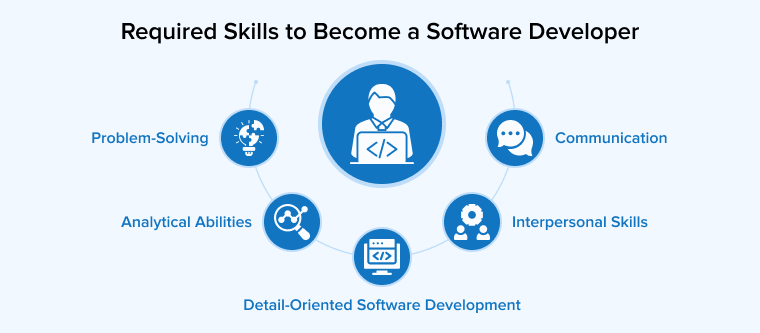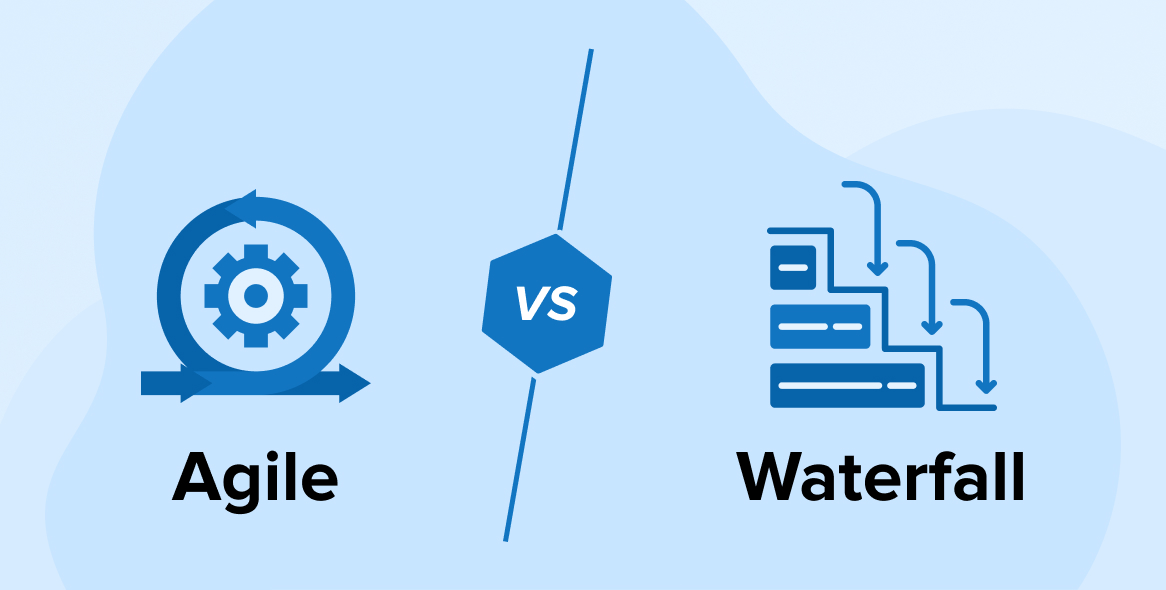
In the absence of software developers, the world will be a very different place. However, what does a software developer do? Let’s take a closer look at the growing industry to discover further about software developers’ daily tasks, their talents, qualifications, compensation, career prospects, and more.
This article discusses the life of a software developer, including employment prospects, income considerations, and their responsibilities towards work. Additionally, you can read about common daily tasks, educational qualifications, and job categories below to assist you in determining whether a future as a developer is suited for you.
1. Who is a Software Developer?
Software developers are responsible for conceptualizing, designing, and developing software with the help of various coding languages. Some create computer system applications, whereas some create the core operating systems. Although many software developers discover customer requirements, create software programs, test and enhance application products. Software developers cooperate with software engineers and play a critical key-role in the tech- systems, computer programming, production, marketing, and software publications sectors.
2. What do Software Developers Do?
Developers are answerable for the production, QA, debugging, and performance of the software. Developer responsibilities vary significantly by type of company. They are often hired by tech firms that build off-the-shelf software or by end-user providers – both commercial and social – that design customized apps. However, apart from coding and designing software, there are more responsibilities and tasks that all the developers need to accomplish mentioned below:
2.1 Studying Other People’s Code
Self-taught coders are usually astonished at how much time is required to study others’ code. The reason software professionals spare so much time studying others’ code is straightforward: actual software programs are extremely complicated creations of vast software development teams, and no one can plunge into something without having put some effort into comprehending it. Additionally, studying code is an excellent approach to polish one’s software development abilities.
2.2 Documenting Code
It’s another point for a developer to comprehend their own software programs; it’s quite another to discover that similar code is intelligible a week, months, or a year later. It’s why skilled developers devote a significant amount of effort to crafting concise feedback and instructions. By defining their personal code, software engineers may also find areas for improvement, enabling them to create a script that works effectively.
2.3 Testing Code
Testing is critical to application development, each developer tests their personal work—just as writers examine their respective work for grammatical and artistic faults.
2.4 Engaging in Meetings
Advanced software development is a joint process, and discussions help keep the entire team focused as well as on task. Agile teams conduct daily sessions that are usually longer than 10 min. Of all, software professionals communicate with one another via group collaboration tools, if only to check in on one another and raise team spirit with a hilarious gif.
2.5 Mentoring
Senior software engineers teach novice software developers, offering their experience, offering guidance, and addressing their queries. Many software development organizations now provide mentorship programs that pair new recruits with older workers, although the approach is not always structured.
3. Required Skills to Become a Software Developer

As a software developer, you’re expected to possess a number of talents, although these requirements differ by position. A qualification is not mandatory, however; expertise and mastery of the wanted abilities are more crucial. The following are some of the most sought-after abilities in a programmer by the majority of jobs:
3.1 Problem-Solving
Since software developers write computer programs, applications software developers must be able to troubleshoot and resolve issues that arise in the process of software development.
3.2 Interpersonal Skills
Since software developers devote the majority of their days training individually on code, they must interact with other programmers or coders to successfully launch new products. To work effectively with each other, positive communication skills are required.
3.3 Detail-Oriented Software Development
As developers typically engage on several components of a system concurrently, they should focus on fine details to avoid a slight mistake from wreaking havoc on the overall network.
3.4 Communication
Developers must be proficient at communicating with coworkers in plain language. Additionally, they have to be prepared to describe how well the program works to users and address any issues that occur.
3.5 Analytical Abilities
This ability relates to the capacity to acquire and evaluate data, solve issues, and make sound judgments. It can assist software developers in designing computer applications that are user-centric.
4. Types of Software Developers
There are several distinct sorts of developers, and the distinctions between them might get muddled. As you gain expertise and professionalism, you can match more kinds. Today, various developers require comparable, if not identical, talents to perform their jobs.
4.1 Front-end Developers
Front-end development refers to the portion of a software program that users view and engage in. For instance, a file manager may be thought of as a front-end that is responsible for storing and retrieving data. The file manager does not comprehend how to save or retrieve information; it just understands how to connect with the storage system in response to human input.
Often, front-end developers lack thorough knowledge of computer technology theories. Rather than that, their competence rests in a variety of JavaScript frameworks, HTML, CSS, user experience design, and UI design.
Competencies in frontend development:
- User interface design (UI)
- User experience design (UX)
- CSS
- JavaScript
- HTML
- UI frameworks
Front-end development is a rapidly growing branch of software design, with new institutions and solutions being published on a regular basis and user requirements evolving at a similar rate. Excellent front-end engineers are critical thinkers who like discovering new technologies and using them to satisfy the demands of end-users.
4.2 Back-end Developers
The back-end developer is an expert in the architecture, execution, operational core concept, scalability, and durability of software or systems that operate on external workstations by the end-user. They incorporate a diverse range of services, including analytics, caches, logs, and email servers, among others.
What enables a website’s front end to function? Where is all of this information kept? A backend developer sets up the system that drives the elements that, when combined, allow the user-facing portion of the webpage to operate at all.
Competencies in backend development:
- Java
- C and C++
- Ruby
- Python
- Scala
- Go, etc.
Additionally, they employ technologies like MySQL, Oracle, and SQL Server to locate, store, and modify data and provide it to the client via front-end coding. Backend developer job descriptions frequently include requirements for familiarity using PHP frameworks such as Zend, Symfony, and CakePHP; knowledge of version control software such as SVN, CVS, or Git; and knowledge of Linux as a design and implementation environment.
4.3 Full-Stack Developers
A full-stack developer is responsible for both the front-end and back-end aspects of a webpage. They possess the necessary expertise for developing a completely functional website. As a full-stack developer, you’ll have additional options because you’ll be working on both the server and client sides.
Competencies in Full-stack development:
- Configuring and installing Linux servers
- To create client-side APIs
- To have a look at the client-side JavaScript is used to fuel an application.
- To approach CSS with a “design eye”
A full-stack developer skills would include that of a front-end and back-end developer. A full-stack developer must know how to configure Linux servers, writing server-side APIs, writing client-side JavaScript to power an application, and applying a design eye to CSS.
5. What’s the Pay For a Software Developer?
According to the BLS, professions in bespoke software development are expected to rise at a rate of 26% through 2026, and over 5X the national mean for all professions.
This is partly due to enterprises’ rising desire to create the latest smartphone apps.
While the forecast for systems software developers is less rosy, it is still anticipated to grow at the pace of 10% than avg.
However this form of labor is less popular, it often pays more.
Income of software developers
According to the Bureau of labor statistics, the median annual compensation for application software engineers was $103,620 in 2018.
The bottom 10% made less than $61,660, while the top 10% earned more than $161,290. A few of the highest-paid app software engineers worked for software publishing firms.
6. Conclusion
Currently, software developers are tasked with a plethora of duties, necessitating the acquisition of a few other talents in order to write code, such as business acumen or soft skills necessary throughout meetings or when presenting diverse facets to customers.
Nonetheless, we must not overlook that in order to be a successful expert, each software developer must possess strong technical skills and an enthusiasm for the profession.




This article perfectly explains what a software developer does. Article perfectly describes different types of software developer roles. It mentioned all necessary skills should be in a software developer. This article discusses the life of a software developer, including employment prospects, income considerations.
This article gives complete details of every day working of a software developer. If you want to know what a software developer does in his everyday work routine then this article is a very helpful guide. Here different types of developers are also discussed in this article.
This article explains the everyday working of a software developer. Analyze the problem and come up with a solution and write the code to tell the computer how to solve the problem. Ensure there aren't any bugs in the software and document the system you worked on for future reference.